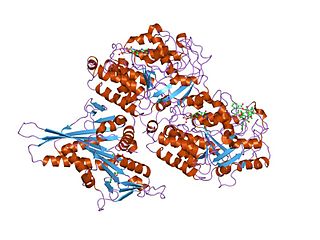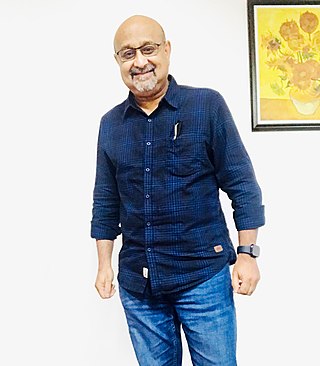
The Indian Institute of Technology Bombay is a public research university and technical institute in Mumbai, Maharashtra.

Tubulin in molecular biology can refer either to the tubulin protein superfamily of globular proteins, or one of the member proteins of that superfamily. α- and β-tubulins polymerize into microtubules, a major component of the eukaryotic cytoskeleton. Microtubules function in many essential cellular processes, including mitosis. Tubulin-binding drugs kill cancerous cells by inhibiting microtubule dynamics, which are required for DNA segregation and therefore cell division.
V Ramgopal Rao is an Indian academic currently serving as the Group Vice Chancellor of Birla Institute of Technology and Science, Pilani for campuses located in Pilani, Dubai, Goa, Hyderabad and Mumbai. He was previously the Director of IIT, Delhi for six years during 2016-2021.
Bhabatarak Bhattacharyya, popularly known as Bablu Bhattacharyya, is an Indian structural biologist, biochemist and academic, known for his studies on the colchicine-tubulin interaction. He is a former professor and the head of the department of biochemistry at the Bose Institute, Kolkata and an elected fellow of the Indian Academy of Sciences, Indian National Science Academy, National Academy of Sciences, India and The World Academy of Sciences. The Council of Scientific and Industrial Research, the apex agency of the Government of India for scientific research, awarded him the Shanti Swarup Bhatnagar Prize for Science and Technology, one of the highest Indian science awards, in 1988, for his contributions to biological sciences.
Tapas Kumar Kundu is an Indian molecular biologist, academician and at present the Director of Central Drug Research Institute, a prestigious research institute of Council of Scientific and Industrial Research at Lucknow. He is the head of the Transcription and Disease Laboratory of Jawaharlal Nehru Centre for Advanced Scientific Research. He is known for his studies on the regulation of Gene expression and his contributions in cancer diagnostics and the development of new drug candidates for cancer and AIDS therapeutics. He is an elected fellow of the Indian Academy of Sciences, Indian National Science Academy and the National Academy of Sciences, India and a J. C. Bose National Fellow of the Department of Science and Technology. The Council of Scientific and Industrial Research, the apex agency of the Government of India for scientific research, awarded him the Shanti Swarup Bhatnagar Prize for Science and Technology, one of the highest Indian science awards, in 2005, for his contributions to biological sciences. He is also a recipient of the National Bioscience Award for Career Development of the Department of Biotechnology.

Rajesh Sudhir Gokhale is currently the Secretary for Department of Biotechnology (DBT) and Department of Science & Technology (DST), Government of India. He joined National Institute of immunology after conducting his postdoctoral training at Stanford University, He was the director of Institute of Genomics and Integrative Biology from 2009 to 2016. Gokhale is known for his studies on the metabolic diversity of pathogens. He is credited with the discovery of a family of Long-chain Fatty acyl-AMP ligases (FAAL) and his studies assisted in the elucidation of biochemical crosstalk between fatty acid synthases and polyketide synthases in Mycobacterium tuberculosis. He holds US and Indian patents for his invention of Method to Modulate Pigmentation Process in the Melanocytes of Skin. An alumnus of the Indian Institute of Science, he is an elected fellow of the Indian Academy of Sciences (2007) and the Indian National Science Academy (2014). The Council of Scientific and Industrial Research, the apex agency of the Government of India for scientific research, awarded him the Shanti Swarup Bhatnagar Prize for Science and Technology, one of the highest Indian science awards, in 2006, for his contributions to biological sciences. He received the National Bioscience Award for Career Development of the Department of Biotechnology in 2009.
Murali Sastry is an Indian material chemist, nanomaterial scientist and the chief executive officer of the IITB-Monash Research Academy. He is a former chief scientist at Tata Chemicals and a former senior scientist at the National Chemical Laboratory. He is known for his studies on surfaces, films and materials chemistry and is an elected fellow of Maharashtra Academy of Sciences and the Indian Academy of Sciences. The Council of Scientific and Industrial Research, the apex agency of the Government of India for scientific research, awarded him the Shanti Swarup Bhatnagar Prize for Science and Technology, one of the highest Indian science awards, in 2002, for his contributions to chemical sciences.

Madhavan Radhakrishna Pillai is an Indian cancer biologist and the former director of the Rajiv Gandhi Centre for Biotechnology. Known for his studies on papilloma viruses, Pillai is an elected fellow of the Indian Academy of Sciences, National Academy of Sciences, India, Royal College of Pathologists and the National Academy of Medical Sciences. The Department of Biotechnology of the Government of India awarded him the National Bioscience Award for Career Development, one of the highest Indian science awards, for his contributions to biosciences in 2002.
Rajendra Prasad Roy is an Indian chemical biologist, biochemist and a scientist at the National Institute of Immunology. Known for his studies in protein engineering, Roy has developed several chemo-enzymatic strategic processes for which he has a patent assigned to him. He holds a PhD from the Indian Institute of Science and is an elected fellow of all the three major Indian science academies namely Indian National Science Academy, Indian Academy of Sciences, and National Academy of Sciences, India. The Department of Biotechnology of the Government of India awarded him the National Bioscience Award for Career Development, one of the highest Indian science awards, for him contributions to biosciences in 2005. Currently he is the dean of Regional Centre for Biotechnology, Faridabad.
Saumitra Das is an Indian microbiologist and a professor at the Department of Microbiology and Cell Biology of the Indian Institute of Science. Known for his studies in the fields of molecular virology and molecular biology, Das is an elected fellow of all the three major Indian science academies namely, the Indian Academy of Sciences, the National Academy of Sciences, India and the Indian National Science Academy. The Department of Biotechnology of the Government of India awarded him the National Bioscience Award for Career Development, one of the highest Indian science awards, for his contributions to biosciences in 2005.
Pramod P. Wangikar is an Indian chemical engineer and a professor at the Department of Chemical Engineering of the Indian Institute of Technology, Bombay. Known for his studies in the field of bioenergy, Wangikar is a recipient of the Sartorius India Chemcon Distinguished Speaker Award of the Indian Institute of Chemical Engineers. The Department of Biotechnology of the Government of India awarded him the National Bioscience Award for Career Development, one of the highest Indian science awards, for his contributions to biosciences in 2006.
Ramasubbu Sankararamakrishnan is an Indian computational biologist, bioinformatician and a professor at the Department of Biological Sciences and Bioengineering of the Indian Institute of Technology, Kanpur. He is known for his computational studies on membrane protein function. The Department of Biotechnology of the Government of India awarded him the National Bioscience Award for Career Development, one of the highest Indian science awards, for his contributions to biosciences in 2008.
Sangita Mukhopadhyay is an Indian molecular cell biologist, immunologist and the head of the molecular biology group at the Centre for DNA Fingerprinting and Diagnostics. Known for her studies on immunosuppression and infection biology, Mukhopadhyay is an elected fellow of all the three major Indian science academies namely the Indian National Science Academy, the Indian Academy of Sciences and the National Academy of Sciences, India. The Department of Biotechnology of the Government of India awarded her the National Bioscience Award for Career Development, one of the highest Indian science awards, for her contributions to biosciences in 2008.
Ashok M. Raichur is an Indian materials scientist, nanotechnologist and a professor at the Department of Materials Engineering of the Indian Institute of Science, Bangalore. Known for his studies on the use of nanotechnology for biomedical and environmental applications, Raichur is a former Alexander von Humboldt Fellow and a life member of the National Academy of Sciences, India. The Department of Biotechnology of the Government of India awarded him the National Bioscience Award for Career Development, one of the highest Indian science awards, for his contributions to biosciences, in 2009.
Debasisa Mohanty is an Indian computational biologist, bioinformatician and a staff scientists at the National Institute of Immunology, India. Known for his studies on structure and function prediction of proteins, genome analysis and computer simulation of biomolecular systems, Mohanty is an elected fellow of all the three major Indian science academies namely the Indian Academy of Sciences, the Indian National Science Academy and the National Academy of Sciences, India. The Department of Biotechnology of the Government of India awarded him the National Bioscience Award for Career Development, one of the highest Indian science awards, for his contributions to biosciences, in 2009.
Hirekodathakallu Venkataramaiah Thulasiram is an Indian bioorganic chemist, chemical biologist and a principal scientist at the National Chemical Laboratory of the Council of Scientific and Industrial Research. he is known for his studies in the fields of biocatalysis and organic synthesis, specifically on isoprenoid biosynthesis. The Department of Biotechnology of the Government of India awarded him the National Bioscience Award for Career Development, one of the highest Indian science awards, for his contributions to biosciences, in 2015.
Arun Kumar Shukla is an Indian structural biologist and the Joy-Gill Chair professor at the department of biological sciences and bioengineering at the Indian Institute of Technology, Kanpur. Known for his studies on G protein-coupled receptor, Shukla is a Wellcome Trust-DBT Intermediate Fellow and a recipient of the SwarnaJayanti Fellowship of the Department of Science and Technology. The Department of Biotechnology of the Government of India awarded him the National Bioscience Award for Career Development, one of the highest Indian science awards, for his contributions to biosciences, in 2017/18. He received the 2021 Shanti Swarup Bhatnagar Prize for Science and Technology in Biological Science. He was awarded the Infosys Prize 2023 in Life Sciences his outstanding contributions to the biology of G-protein coupled receptors (GPCRs).
Ranjith Padinhateeri is an Indian biological physicist and a professor at the Indian Institute of Technology, Mumbai. He is known for his biological studies using statistical mechanics, polymer physics, and soft matter theory. The Department of Biotechnology of the Government of India awarded him the National Bioscience Award for Career Development, one of the highest Indian science awards, for his contributions to biosciences, in 2017–18.

Rohit Srivastava is a professor in the Department of Biosciences and Bioegineering at IIT Bombay specialising in medical diagnostic devices, nanoengineered materials and photothermal cancer therapy. He was awarded the Shanti Swarup Bhatnagar Prize for Science and Technology in Medical Sciences in the year 2021 for his contributions to the development of affordable medical devices.





